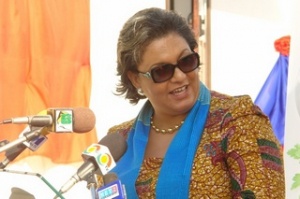Ghana’s foreign affairs minister Hanna Tetteh says signing onto the Economic Partnership Agreement might do the trick for industrialising the ECOWAS sub region, since according to her, the agreements could help foster better economic integration.
“Have you heard of prohibition lists from specific member states that say that particular imports can’t go into their countries because as a matter of fact they can manufacture them themselves so they don’t need them from other member-states? Do we really think that ECOWAS is the answer to our industrialisation problem? It can be, but it needs a hell of a lot more work. It needs commitment from the member-states to make the ETLS work. And you know, an EPA might just do the trick,” Hanna Tetteh said at a public forum in Accra on the EPAs.
Ghana’s President John Mahama recently complained about the tall list of trade prohibitions from Nigeria, which he said, limits regional trade and by extension, frustrates economic integration in the ECOWAS region.
Mr Mahama told an audience of the Africa Summit at the London School of Economics that he found it befuddling that Africa’s most populous country is not respecting the Economic Trade Liberalisation Scheme (ETLS) of the Economic Community of West African States.
The Ghanaian President said Nigeria’s protectionist measures do not bode well for regional trade and integration, adding that the country has more responsibility to foster the integration agenda since it wields tremendous economic power in the sub region.
“Nigeria has nothing to fear from Ghana in terms of competition. Nigeria has nothing to fear from Cote D’lvoire in terms of competition. Nigeria has nothing to fear from Benin or Togo or Niger in terms of competition and yet year in, year out, there is a prohibition list,” he said. Already seen as an economic giant in Africa, Nigeria recently became the Continent’s biggest economic hub after a rebasing exercise which resulted in the oil-rich West African country nudging off South Africa from the top.
Its GDP for 2013 totalled 80.3 trillion naira (£307.6bn: $509.9bn). That compares with South Africa's GDP of $370.3bn at the end of 2013. Hanna Tetteh said at the Accra EPA forum held on Thursday that Ghana, Nigeria and The Ivory Coast could take advantage of such economic integration to turn the region into a hub that will drive the region’s industrial growth. She believes the EPAs could help that process.
The EPAs are legally binding bilateral contracts between the European Union (EU) and individual African Caribbean Pacific countries.
Once signed, EPAs warrant that within two decades, about 80% of that country’s market should open to European goods and services tariff-free. The European Parliament has granted the African countries an extension until October 2014 to ratify their interim EPAs.
There’s a phalanx of civil society organisations resisting the signing of the EPAs in Ghana. The Ghana Trades Union Congress (TUC), the Christian Council of Ghana, the Ghana Chamber of Commerce, the Socialist Forum, and the Economic Justice Network of Ghana are among some of the harshest critics. They have petitioned President John Mahama against signing it. West African giant Nigeria has said it will not sign the agreement.
At a recent meeting of African heads of state at Yamoussoukro in The Ivory Coast over the EPAs, Hanna Tetteh told Journalists: “we can’t have a single country position. That is the whole thing about having a regional agreement. We must have a regional consensus.”
According to her, “it’s not a question of what is Ghana’s stance because this is an ECOWAS decision. Either we all agree or we don’t agree.”
Click to view details



Business News of Thursday, 17 April 2014
Source: xyz

















